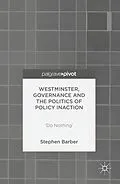This book shows how political inaction has shaped the politics, economy and society we recognize today, despite the fact that policymakers are incentivised to act and to be seen to act decisively. Politicians make decisions which affect our lives every day but in our combative Westminster system, are usually only held to account for those which change something. But what about decisions to do nothing? What about policy which is discarded in favour of an alternative? What about opposition for naked political advantage? This book argues that not only is policy inaction an overlooked part of British politics but also that it is just as important as active policy and can have just as significant an impact on society. Addressing the topic for perhaps the first time, it offers a provocative analysis of 'do nothing' politics. It shows why politicians are rarely incentivized to do nothing, preferring hyperactivity. It explores the philosophical and structural drivers of inaction when it happens and highlights the contradictions in behavior. It explains why Attlee and Thatcher enjoyed lasting policy legacies to this day, and considers the nature of opposition and the challenge of holding 'do nothing' policy decisions to account.
Stephen Barber is Associate Professor in Public Policy at London South Bank University, UK, where he teaches on its leading Masters in Public Administration programme and a Senior Research Fellow at the Global Policy Institute. A frequent media commentator, he has published five previous books and numerous scholarly articles.
Autorentext
Stephen Barber is Associate Professor in Public Policy at London South Bank University, UK, where he teaches on its leading Masters in Public Administration programme and a Senior Research Fellow at the Global Policy Institute. A frequent media commentator, he has published five previous books and numerous scholarly articles.
Klappentext
This book shows how political inaction has shaped the politics, economy and society we recognize today, despite the fact that policymakers are incentivised to act and to be seen to act decisively. Politicians make decisions which affect our lives every day but in our combative Westminster system, are usually only held to account for those which change something. But what about decisions to do nothing? What about policy which is discarded in favour of an alternative? What about opposition for naked political advantage? This book argues that not only is policy inaction an overlooked part of British politics but also that it is just as important as active policy and can have just as significant an impact on society. Addressing the topic for perhaps the first time, it offers a provocative analysis of 'do nothing' politics. It shows why politicians are rarely incentivized to do nothing, preferring hyperactivity. It explores the philosophical and structural drivers of inaction when it happens and highlights the contradictions in behavior. It explains why Attlee and Thatcher enjoyed lasting policy legacies to this day, and considers the nature of opposition and the challenge of holding 'do nothing' policy decisions to account.
Stephen Barber is Associate Professor in Public Policy at London South Bank University, UK, where he teaches on its leading Masters in Public Administration programme and a Senior Research Fellow at the Global Policy Institute. A frequent media commentator, he has published five previous books and numerous scholarly articles.
Inhalt
Introduction: A Systemic Problem for Westminster Government.- Chapter 1. Why Do Nothing and Who Does It?.- Chapter 2. Why Does 'Do Nothing' Politics Matter?.- Chapter 3. How is 'Do Nothing' Politics held to account?.
Titel
Westminster, Governance and the Politics of Policy Inaction
Untertitel
'Do Nothing'
Autor
EAN
9781137487063
ISBN
978-1-137-48706-3
Format
E-Book (pdf)
Hersteller
Herausgeber
Veröffentlichung
24.11.2016
Digitaler Kopierschutz
Wasserzeichen
Dateigrösse
1.23 MB
Anzahl Seiten
97
Jahr
2016
Untertitel
Englisch
Unerwartete Verzögerung
Ups, ein Fehler ist aufgetreten. Bitte versuchen Sie es später noch einmal.
